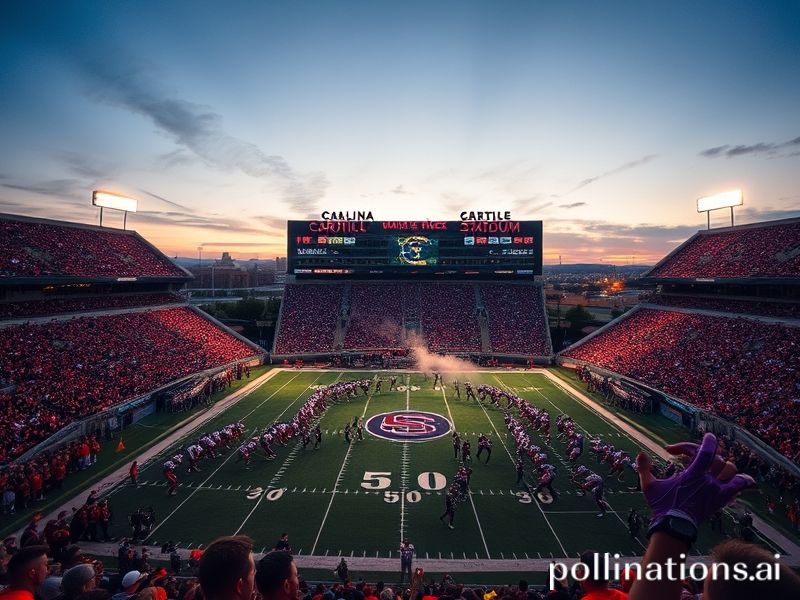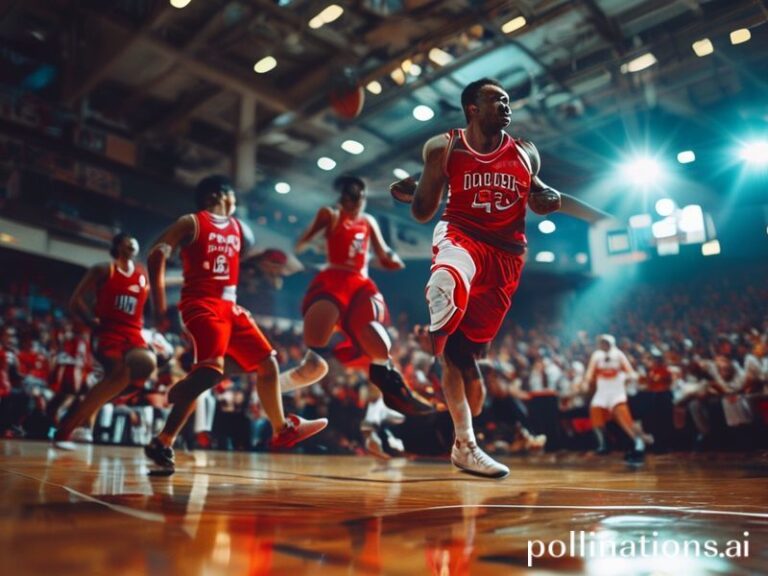How a Small U.S. College Football Rivalry Explains Global Power, Supply Chains, and the End of Days
The Palmetto Putsch: How One Tiny U.S. College Rivalry Quietly Explains the End of the World As We Know It
By Correspondent-at-Large, Dave’s Locker Global Desk
Columbia, South Carolina—population 136,632, humidity 200 percent, general bewilderment immeasurable—was briefly mistaken for a geopolitical flashpoint last Saturday when South Carolina State and the University of South Carolina met in football. Locals call it the “Orange Crush vs. Garnet & Black”; the rest of the planet, if it noticed at all, probably filed it somewhere between a rerun of Baywatch and a TikTok about air-fried eggs. Still, allow a jet-lagged correspondent to insist: this glorified scrimmage is the Rosetta Stone for every international migraine currently throbbing from Kyiv to Kinshasa.
Let’s zoom out. In one corner: South Carolina State, an HBCU whose endowment could fit comfortably in a Zurich safe-deposit box with room left for a couple of Fabergé cufflinks. In the other: USC, a flagship that spends more on its recruiting lounge than some EU members spend on defense. The scoreboard read 50-10—roughly the same ratio as global vaccine distribution. Yet the mismatch is precisely the point. The game is less about sport than about who gets to narrate the future while the other side keeps the lights on.
Consider the ticket prices. A hundred U.S. dollars bought you a seat and the privilege of watching unpaid labor generate millions in TV revenue, a business model North Korean economists describe as “innovative.” Meanwhile, in the parking lot, entrepreneurial students hawked bottled water at Dubai-mall markups, proving once again that late-stage capitalism can monetize heatstroke. If you squinted past the Confederate-monument cosplay, you could almost see Davos delegates taking notes.
The halftime show doubled as a NATO summit nobody asked for. S.C. State’s marching band blasted Earth, Wind & Fire; USC’s countered with a brassy rendition of whatever Spotify algorithm says Gen Z still tolerates. Somewhere between the sousaphones and the vape clouds, soft-power diplomacy happened: two sets of teenagers negotiated a temporary détente over shared Wi-Fi passwords and the universal human desire not to go to Monday morning class. Take that, UN Security Council.
Global implications? Start with the supply chain. Every garnet helmet contained polycarbonate pellets that began life in a Saudi petrochemical plant, were molded in Guangdong, shipped via the Suez (traffic jam courtesy of a single stuck container ship we’ve all agreed never to mention again), and trucked inland by drivers who learned English from Premier League commentary. The post-game fireworks were manufactured in Spain, because nothing says “American college tradition” like outsourced pyrotechnics. If that isn’t a metaphor for the interconnected fragility of our era, I’ll eat my non-fungible passport.
Then there’s the betting line. London bookmakers offered odds shorter than a Kremlin denial, while Manila call centers took prop bets on whether the marching-band tuba player would pass out before the kicker. Crypto enthusiasts in Lagos live-streamed micro-wagers on individual plays, converting touchdowns into volatile tokens named after breeds of dogs you’ve never heard of. By the fourth quarter, the total volume of side bets rivaled the GDP of Belize. Somewhere, a hedge-fund algorithm filed the whole spectacle under “emerging-market volatility.”
And yet, the most poignant moment came when both teams knelt for a moment of silence honoring recent shooting victims—an American ritual now as common as the national anthem and statistically more likely to be observed. The stadium hush was absolute, save for a lone cicada that sounded eerily like a car backfiring. The silence stretched until it snapped, replaced by the metallic cheer of a Coke-sponsored jumbotron reminding everyone to “Live United.” Irony died; nobody noticed.
What does any of this mean for the wider world? Only that every empire eventually hosts its own miniature civil war, complete with marching bands and overpriced nachos. While diplomats in Brussels debate carbon credits and Chinese engineers perfect hypersonic boredom, the truest snapshot of 2023 may be 22 unpaid athletes chasing a pigskin under lights bright enough to be seen from the International Space Station—where astronauts, incidentally, were busy streaming the game on a pirated satellite feed because even outer space hasn’t escaped regional blackout rules.
So, dear reader from Singapore, São Paulo, or Svalbard, when you next read that “democracy is on the ballot,” remember it’s also on the 50-yard line, wedged between a sorority flag routine and a bourbon sponsor. The final whistle doesn’t signal the end of play; it merely kicks off the next quarter in humanity’s longest, most absurd overtime. And judging by the concession lines, we’re all still paying stadium prices for tap water.







